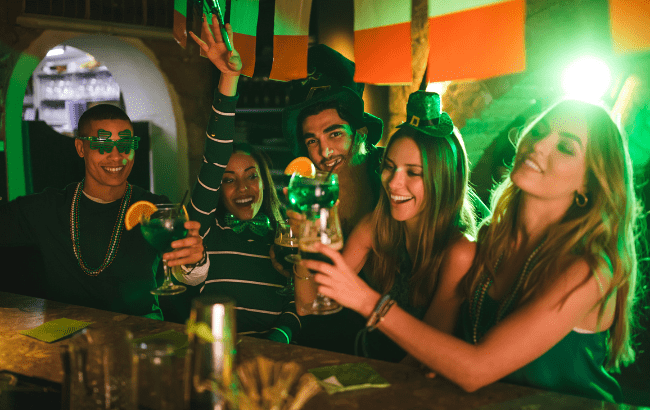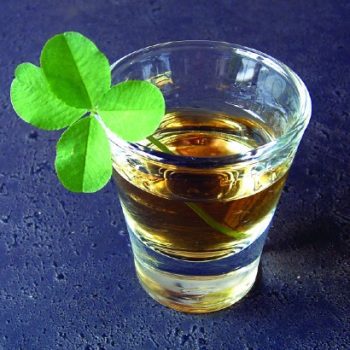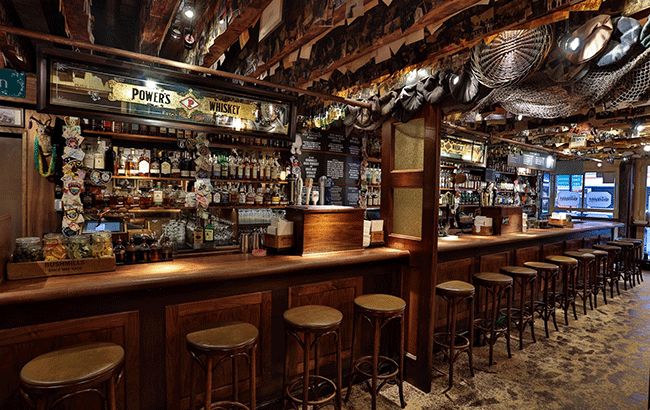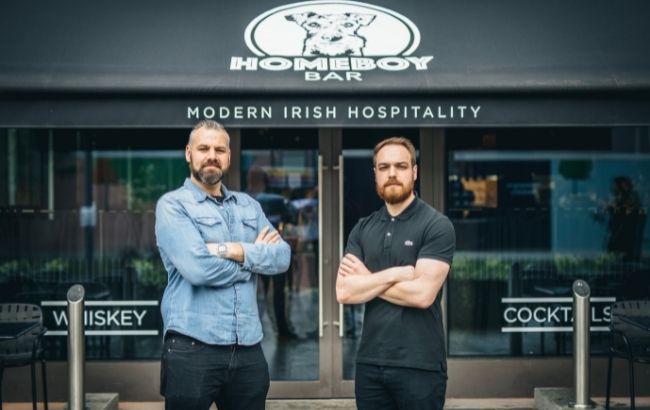How can bars authentically celebrate St Patrick’s Day?
With approximately 22 times the population of Ireland celebrating St Patrick’s Day in the US every year, the holiday is a lucrative one for the on-trade. But have bars lost sight of what the celebration is about?

According to Forbes, more than 33 million people living in the US claim Irish heritage, and nearly 90 million Americans of non-Irish descent join them in celebrating Ireland’s national holiday on 17 March. This generates an average spend of US$5.6 billion annually over the holiday.
In data released by Nielsen IQ in 2019, St Patrick’s Day was reported to be the highest grossing day of the year for US bars and restaurants. Compared to an average day in the year prior, spirits sales rose by 153% on the Irish national day, with one-third of American consumers surveyed saying they had visited a bar on the 17 March.
Meanwhile last year in the UK, St Patrick’s Day lifted sales in the on-premise by 37%, compared to the same period in 2019. This was driven by a 25% upswing in spirits sales compared to the year before, along with a 7% boost in beer sales, and a 10% rise in cider sales.
Furthermore, in Ireland more than a quarter (27%) of consumers said they planned to visit pubs, bars and restaurants for the celebrations in 2022, with nearly half (48%) of those saying they were likely to trade-up their drinks choices for the occasion.
‘Plastic Patty’
However, while the celebration is obviously a beneficial one to the on-trade, some Irish bar owners and producers have shared concerns with The Spirits Business that the foundations of the holiday have become over-commercialised and contaminated with values not in line with the celebration.
“When I first came to America 12 years ago, somebody brought me to the St Patrick’s Day parade, and I was super excited,” said Belfast-born Jack McGarry, founder of New York’s The Dead Rabbit. “I said ‘Oh my god, I can’t believe New York City has a party for Ireland’, it blew my mind. But as I got closer to the parade, I could see guys pissing on the street, and people vomiting.
 “I’m not here to tell any other bar how to celebrate, but that seems to be the way most bars celebrate St Patrick’s Day. I think they see it as a green card to get absolutely messed up, and nobody’s gonna say anything because ‘that’s the Irish way’, or whatever crap that goes along with that. It seems like the Irish get a real bad rap, just because we produce some of the best alcohol, so [people] just immediately assume we’re also drinking it all.”
“I’m not here to tell any other bar how to celebrate, but that seems to be the way most bars celebrate St Patrick’s Day. I think they see it as a green card to get absolutely messed up, and nobody’s gonna say anything because ‘that’s the Irish way’, or whatever crap that goes along with that. It seems like the Irish get a real bad rap, just because we produce some of the best alcohol, so [people] just immediately assume we’re also drinking it all.”
McGarry says that, particularly in America, there is a ‘plastic’ fascination with Ireland. “They call it ‘Patty’ with two T’s, they have this thing where people come in and ask for Irish car bombs, not aware of how insensitive that is to Irish people.”
He continued: “[They think its] all ‘top of the morning to you’, it’s shamrocks, all that kind of stuff. And that’s not representative of the culture of Ireland right now.”
McGarry admits that for some venues, leaning into the stereotypes and tropes of Irish culture can be beneficial, and with an estimated 150,000 people attending the New York St Patrick’s Day parade every year, there is clearly a market for it, but he and his team believe this goes against what The Dead Rabbit is as a bar.
“It’d be easy for Dead Rabbit to go all in, but again, I think there are elements of responsibility to do it right, and also being a responsible part of the communities that we operate in and be a great company.
“At Dead Rabbit we don’t have a ‘drinking culture’. I try to make sure that we’re seen as professionals, and that Ireland as a whole is seen for having a lot of great stuff going on beyond those old tropes and stereotypes.
“We use [St Patrick’s Day] as an opportunity to – in a nice way that’s not combative – talk about what we actually do in Ireland, because to me St Patrick’s Day is almost the way the Americans celebrate Thanksgiving – you have that part with your family, and then you go out that night you celebrate with your family or your friends. So we try to promote that part of St Patrick’s Day, and it’s the same with the bar.”

This year, The Dead Rabbit celebrates its 10th year of trading, and will be adding two further venues to its portfolio, the first in Austin, Texas, in the summer, and the second in New Orleans, in winter.
Across all venues, authenticity in the bars’ offering will remain paramount. “As we grow, making sure everything we do is authentic and speaks to the strategy of celebrating the Ireland of today is key. That means making sure we have a great cocktail programme that’s inclusive, that’s sessionable, that’s dynamic and diverse, and making sure that we cover those elements and consistently executing them.
“Authenticity is critical for us throughout every single facet of the company. So all the music is contemporary Irish musicians. You’re not coming in here to hear Dropkick Murphys, or the Corrs, or U2 from the 80s or something like that – you’re hearing people that are actually relevant in Ireland right now, rather than those assumed to be relevant in Ireland, right? It’s the same for the artwork – all ours photographers, printmakers, artists that are on the walls are Irish, you know – you’re not going to see a picture that we just printed off Google.”
Irish hospitality
Aaron Wall, co-founder of Homeboy in London, believes that in order to authentically celebrate the holiday, bars should focus on what it really means to be Irish. “It’s about our innate hospitality, and that’s our whole thing at Homeboy: modern Irish hospitality. And why St Paddy’s Day works in that way, is it’s about bringing people together and all that has to be all tied in.
“Our idea of modern Irish hospitality comes from old Brehon Laws,” Wall explains.
The Brehon Laws were based on a notion of keeping the peace between neighbours, and this included “lots of laws based around hospitality”.
“The laws meant that if someone came seeking hospitality off you day or night, you have to offer them four key actions: a warm bed, a hot meal, a drink, and entertainment. The only payment you could take for these actions were stories of your travels. To us, this is what we enjoy doing at Homeboy. We don’t offer a bed but we offer a warm welcome, with warm food, drink and entertainment, and to this day, the Irish still have that idea of all those points.”

McGarry added: “So in terms of how The Dead Rabbit does it, we celebrate the things that make Ireland Ireland, so obviously our hospitality, the food, the culture, the drinks, we celebrate that and we use it as an opportunity to sort of shatter [the American pre-conception of St Patrick’s Day].”
Its not just the on-trade that is seeking to dispel the stereotypes of St Patrick’s Day. Last year, Irish whiskey producer Tullamore Dew chose to use the day to educate consumers with its “Paddy’s not Pattie’s” campaign, in reference to the common mistake made by American consumers when referring the country’s patron saint.
This year, Irish cream liqueur brand Coole Swan plans to stay “in step with today’s Ireland and how consumers enjoy St Patricks Day now”.
Mary Sadlier, Coole Swan CEO, explained: “It can be easy for brands to fall into the rhythm of looking backwards on a day that has been celebrated for so long, but Ireland has evolved culturally, economically and socially. Brands that showcase and celebrate that will automatically feel more authentic.”
Sadlier added: “It’s a massive day celebrated all around the world, of course it’s commercialised, I’m not sure how that could have been avoided. At some points in the celebration it does seem a bit stuck in a moment in time, rather than in step with the Ireland of today.
“It might feel fresher and more relevant if we find a way to showcase and celebrate what’s great about Ireland today.”
Related news
The Radicle brings $10 cocktails to Chicago
